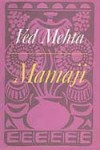
Mamaji
In this deeply affecting chronicle of a high-caste Hindu family, Ved Mehta tells of his mother, Shanti Devi Mehta—Mamaji, as her children called her—and of her forebears. Mamaji’s grandfather hawked lengths of cheap cloth through the fetid gullis of his native Lahore and the alien lanes of Peshawar. Mamaji’s father rose to be a lawyer in the Punjab High Court, a Senate Fellow of Punjab University, and a director of the Punjab National Bank, and received a title from the British. In time, Mamaji herself became the shy, orthodox wife of a cosmopolitan British and American-trained physician who held high posts in the public health service under the raj. The book is a layering of the stories of all those whose lives touched Mamaji’s life—not only her forebears but also her other relatives and her friends and neighbors—and so brings close to us a place and a civilization that could hardly be more remote from our own: India in the late nineteenth and early twentieth centuries.
 Mamaji grew up believing that she brought bad luck to herself and others, and so it seemed at first. She received only a few years of schooling, and her early life revolved around neverending household duties, ancient home remedies, and orthodox Hindu rituals that were proscribed by her father but were practiced in secret in the women’s quarters; before she was fifteen, she had lost five sisters and three brothers through illness or accident. When she was seventeen, she could only listen while her father discussed the terms of her dowry with her husband-to-be, Dr. Amolak Ram Mehta—Daddyji, as their children were to call him—because custom forbade her to see him until the day of her marriage. Little in her experience had prepared her to share her life with Daddyji, who spoke English, frequented clubs where he played cricket, tennis, and bridge, and, as a man of science, regarded her orthodox Hindu practices as superstition. Yet Mamaji could say many years later that she must have sacrificed pearls and diamonds in a former incarnation to have deserved to become his wife.
Mamaji grew up believing that she brought bad luck to herself and others, and so it seemed at first. She received only a few years of schooling, and her early life revolved around neverending household duties, ancient home remedies, and orthodox Hindu rituals that were proscribed by her father but were practiced in secret in the women’s quarters; before she was fifteen, she had lost five sisters and three brothers through illness or accident. When she was seventeen, she could only listen while her father discussed the terms of her dowry with her husband-to-be, Dr. Amolak Ram Mehta—Daddyji, as their children were to call him—because custom forbade her to see him until the day of her marriage. Little in her experience had prepared her to share her life with Daddyji, who spoke English, frequented clubs where he played cricket, tennis, and bridge, and, as a man of science, regarded her orthodox Hindu practices as superstition. Yet Mamaji could say many years later that she must have sacrificed pearls and diamonds in a former incarnation to have deserved to become his wife.
 Mamaji’s story is taken to the point where Ved Mehta’s own story begins: his bout with meningitis when he was nearly four, which left him permanently blind; Mamaji’s inability to accept his blindness; and her impassioned search for a miraculous cure.
Mamaji’s story is taken to the point where Ved Mehta’s own story begins: his bout with meningitis when he was nearly four, which left him permanently blind; Mamaji’s inability to accept his blindness; and her impassioned search for a miraculous cure.
Mamaji is a companion book to Mr. Mehta’s highly acclaimedDaddyji, and together the two biographical portraits form the cornerstone of the Continents of Exile series.